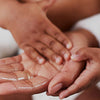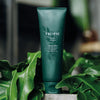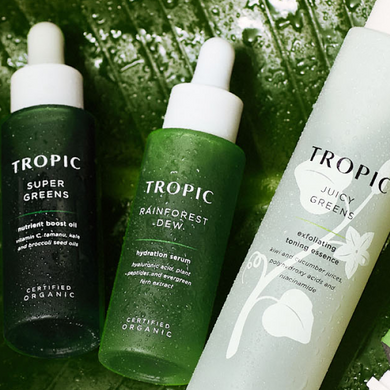Why curating and investing in your skincare routine merits the same attention as your wardrobe.
Don't get me wrong. I've always loved fashion. The out-there runway shows, the tucked-away vintage stores, the impulse-buy bargains. I lap up costume dramas (for the costumes) and fashion exhibitions to find out who wore what when. I've mixed. I've matched. And made a few brave statements that have earned satisfying compliments. But I've long kept in mind one thing. No matter how great my outfit might be, what people tend to remember is if I looked well. More precisely, whether I was fresh of face or drained and tired. Whether there was lightness in my spirit or heaviness in my heart. The rest is window dressing.
Your skin, then, is equivalent to the most individual item of clothing you possess, and more literally, the one you never take off. So it's a no-brainer to treat it with respect. After all, it's part of your body's first line of defence against infection. Keeps you warm. Cools you down. Performs a zillion processes 24/7, while cushioning you against life's hard knocks.
Are pricey products worth it?
But while investing in skincare makes sense, this doesn't mean rushing to the most expensive maybe-miracle in a jar. It's about finding products that deliver results you can appreciate, with textures and scents you enjoy. Just as fashion's concept of calculating ‘cost per wear' and ‘cost per compliment' can indicate return on investment, so can considering how many applications your skincare serves up and how many “you look well's” you receive. (Note: saying it to yourself counts as well.)
The fashion analogy extends to the idea of creating a skincare ‘wardrobe', starting with the three S's: the staples, the specials and the seasonals. The staples are like your jeans, jackets and white Ts, so think natural cleansers, toners and moisturisers. The specials, such as smart pieces and party numbers, are the natural serums and masks with maybe more active ingredients. The seasonals (warm jumpers, light cottons) are products that you might toggle between depending on conditions, from rich balms and oils to cooling formulations.
But the value of skincare doesn't end there. The daily ritual can be almost meditative, something calming you can rely on, regardless of the madness swirling around you. Those mirror moments offer an opportunity to both prep for the day and reflect on the day – like having a conversation with yourself.
I was reminded of this truth during the summer. Our next door neighbour throughout my childhood always looked beautiful in an understated way. Gaye had red hair. Clear skin. Was softly spoken and kind to everyone. She had three sons and lived a long, elegant life before she recently passed away. In her eulogy, we learned she played cricket at club level. She worked in the cosmetics halls of London and Surrey stores. She was always telling her six granddaughters to “cleanse, tone and moisturise” which, let's be honest, isn't a lesson you expect to learn at a funeral.
Yet somehow it didn't seem out of place because for Gaye, her passion for skincare and makeup wasn't about vanity. It was shorthand for encouraging self-care and the part it can play in raising self-esteem. The fact she always looked so immaculate, whether she was partying or pitching up at the crease, was her way of demonstrating not just respect for herself, but for the occasion and others.

Now, more than ever, the value of your skincare also relates to choosing a brand whose ethos resonates with you – one that aligns with your evolving lifestyle. Just as we're seeing the error of our unethical ways in fashion, so too are we demanding social responsibility from beauty brands. We want ingredients that aren't likely to irritate or harm our health or the environment – and given the now-enormous interest in the food we put into our bodies, it follows that we're caring more about what we're putting onto our skin too.
However, what one brand means by ‘green' or ‘natural' may differ from another. Being invested in interpreting the buzzwords might mean scrutinising a brand's environmental credentials – such as carbon neutral certification – how much (or rather, how little) waste it sends to landfill and whether it offers recyclable, biodegradable or refillable packaging. And to find a cruelty-free brand, you'll be checking out adherence to programmes such as Leaping Bunny , as well as registration with organisations such as PETA, The Vegan Society. If skincare with plant-based ingredients is a core value, it's good to know products can be innovative and effective. For instance, Kalahari melon seed oil (a nod to Tropic's Eye Dream) is rich in skin-loving essential fatty acids and antioxidants. Not only that, this drought-resistant crop brings positive ecological, economic and social advantages to where it's cultivated.
Be aware, though, that being natural doesn't automatically bestow an unassailable halo. If you grow and harvest a whole plant, simply to obtain a tiny extract, or cultivate an in-demand natural raw material that escalates deforestation, that's clearly failing on the sustainability front, which is why sometimes, creating a nature-identical ingredient in a lab can also be an eco-conscious route.
The real value of skincare
The bottom line is that it has become incumbent upon brands that benefit from the world's abundant and biodiverse areas to demonstrate an awareness that these habitats need protecting and get behind projects that are committed to that aim, while ensuring the local communities are supported in sustainable agriculture, with fairer access to education. When knowledge of conservation is converted to meaningful contribution, that's when the value of skincare multiplies and radiates – when beauty really does become more than skin deep.
 Skincare
Skincare
 Body Care
Body Care
 Sun Care
Sun Care
 Makeup
Makeup
 Bestsellers
Bestsellers
 Mama & Baby
Mama & Baby
 Men's
Men's
 Haircare
Haircare

